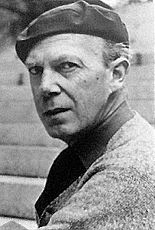Gunnar Ekelöf facts for kids
Quick facts for kids
Gunnar Ekelöf
|
|
|---|---|

Gunnar Ekelöf
|
|
| Born | 15 September 1907 Stockholm, Sweden |
| Died | 16 March 1968 (aged 60) Sigtuna, Sweden |
| Occupation | Poet |
| Nationality | Swedish |
| Period | 1932–1968 |
| Literary movement | Modernism, Surrealism |
| Notable works |
|
| Spouse | Gunnel Bergström (1932) Gunhild Flodquist (1942–1951) Ingrid Flodquist |
Bengt Gunnar Ekelöf (born September 15, 1907, in Stockholm – died March 16, 1968, in Sigtuna) was a famous Swedish poet and writer. He became a member of the important Swedish Academy in 1958. He also received an honorary doctorate degree from Uppsala University that same year. Gunnar Ekelöf won many awards for his amazing poetry.
Contents
Discovering Gunnar Ekelöf's Life and Works
Gunnar Ekelöf is known as Sweden's very first Surrealist poet. Surrealism is an art movement that explores dreams and the unconscious mind. His first poetry book, sent på jorden (meaning "late on earth"), came out in 1932. This book was a bit of a rebellion in literature. It was similar to how Edith Södergran's Septemberlyran had been years before.
Early Poetry and Unique Style
Even though he didn't reject his first book, Ekelöf started writing in a more romantic style. His second poetry collection, Dedikation (1934), got much better reviews. Both of these early books were influenced by Surrealism. They showed a wild flow of images and broke away from traditional poetry rules. Ekelöf often used unusual language and a rebellious spirit. He felt like an outsider and a rebel from his teenage years. He didn't always agree with the ways of the upper classes. A Swedish critic, Anders Olsson, said Ekelöf chose poetry because it allowed him to express the confusing and empty parts of language and the mind.
Influences and Acclaimed Works
His book Färjesång (1941) was influenced by the poet T. S. Eliot. Ekelöf had even translated Eliot's poem East Coker into Swedish. This book also showed influences from Eastern poetry and the dark mood of World War II.
After this, he published other well-known works:
- Promenader (1941), a prose book meaning "Walks".
- Non Serviam (1945), a disillusioned collection. Its Latin title means "I will not serve".
- Om hösten (1951), meaning "In autumn". This book included the famous poem "Röster under jorden" ("Underground voices").
In Strountes (1955), which comes from the Swedish word "strunt" meaning "nonsense", Ekelöf went back to challenging old literary rules. He explored the idea of meaninglessness. Through his clever wordplay, he showed that even from apparent nonsense, meaning can appear.
Later Works and Recognition
In April 1958, Gunnar Ekelöf was chosen to be a member of the Swedish Academy. This is a very important group in Sweden that works to promote the Swedish language and literature. He took the place of author Bertil Malmberg.
En Mölna-elegi ("A Mölna Elegy", 1960) was a long poem that Ekelöf had started writing in the 1930s. It was a very personal collection of thoughts, feelings, and memories. It included references to other famous writers and thinkers like Emanuel Swedenborg and August Strindberg. The poems in this book explored the theme of memory, much like the writer Marcel Proust. Many critics praised this book when it was published.
The Byzantine Trilogy
Ekelöf's last works were a series of three books with a Byzantine theme:
- Dīwān över Fursten av Emgión (1965, ``Diwan on the Prince of Emgion``)
- Sagan om Fatumeh (1966, "The Tale of Fatumeh")
- Vägvisare till underjorden (1967, "Guide to the Underworld")
This trilogy was inspired by a trip Ekelöf took to Istanbul and Izmir in 1965. He felt this trip was a "revelation" that changed his life. Dīwān över Fursten av Emgión tells the story of a fictional Prince of Emgión. This prince fought in the Battle of Manzikert, was captured, tortured, and blinded. He was then jailed in Constantinople for ten years. On his way home, a mysterious woman helps him because he cannot see. For this amazing book, Ekelöf won the Nordic Council Literature Prize in 1966.
Gunnar Ekelöf passed away on March 16, 1968. He wished for his ashes to be scattered in the Pactolus river in Turkey.
Gunnar Ekelöf's Legacy
Gunnar Ekelöf is remembered as one of Sweden's first Surrealist poets. He greatly influenced Swedish literature.
On his 103rd birthday, many Swedish poetry fans gathered in Salihli, Turkey. They honored Ekelöf's memory in the city he loved and wrote about in his poems. He had wished for his ashes to be spread over the Sard stream in Salihli. A statue of Ekelöf by Gürdal Duyar was meant to be placed there, but it is now in the garden of the Swedish Embassy in Istanbul.
See also
 In Spanish: Gunnar Ekelöf para niños
In Spanish: Gunnar Ekelöf para niños
 | Tommie Smith |
 | Simone Manuel |
 | Shani Davis |
 | Simone Biles |
 | Alice Coachman |

